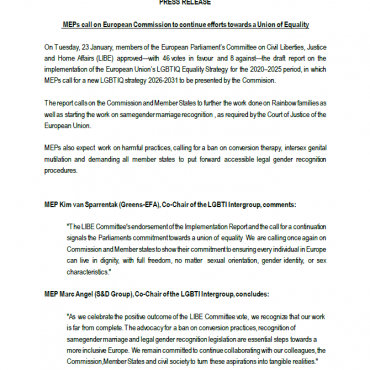European Parliament says all international couples should enjoy the same property rights
Today the European Parliament adopted two resolutions to simplify legal procedures for international couples in the event of divorce or death. The texts include provisions for equal treatment between spouses and registered partners.
 Last year the European Commission proposed two new EU regulations to simplify sharing and dividing couples’ property, including real estate and financial assets, when they move between EU Member States.
Last year the European Commission proposed two new EU regulations to simplify sharing and dividing couples’ property, including real estate and financial assets, when they move between EU Member States.
Under the Commission’s proposals, spouses would have been allowed to choose which national law applies when dividing their property, whilst registered partners would have been forced to use the law under which they registered.
The Fundamental Rights Agency had said in an opinion the discrepancy was discriminatory and unfounded.
In two resolutions adopted today with an overwhelming majority, the European Parliament suggested changes to make sure the same choices were available in both situations.
Under these changes, registered partners would be allowed to choose their applicable law, as long as registered partnerships existed under that law. The texts also reassure Member States that national marriage and family laws won’t be affected.
Alexandra Thein MEP, Rapporteur for the two resolutions and member of the LGBT Intergroup, commented: “This sends a very important signal: married couples and registered partners, regardless of their gender, must be able to enjoy the same freedom of movement across the European Union.”
“I’m glad the European Commission finally agreed with Parliament and with the Fundamental Rights Agency that registered partners too could choose their applicable law.”
Michael Cashman and Evelyne Gebhardt MEPs, Rapporteurs for the opinions in the Civil Liberties committee, added: “The Civil Liberties Committee had made a point that all couples should enjoy the same rights. We now hope the Council will listen to Parliament’s requests.”
Under the consultation procedure, today’s resolutions are the Parliament’s opinion. Member States are now responsible for adopting the binding legislation in the Council of the European Union.
Read more:
- Read the resolution on the property regimes of married couples
- Read the resolution on the property regimes of registered partners
- Read the short briefing by the European Parliament’s Library
- FRA: Registered partners should have the same property rights as spouses under EU law
- Commission proposes to facilitate freedom of movement for all couples






